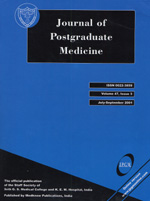
|
Journal of Postgraduate Medicine
Medknow Publications and Staff Society of Seth GS Medical College and KEM Hospital, Mumbai, India
ISSN: 0022-3859
EISSN: 0022-3859
Vol. 55, No. 2, 2009, pp. 97-103
|
 Bioline Code: jp09028
Bioline Code: jp09028
Full paper language: English
Document type: Research Article
Document available free of charge
|
|
|
Journal of Postgraduate Medicine, Vol. 55, No. 2, 2009, pp. 97-103
| en |
Quality of life of parents of children with newly diagnosed specific learning disability
Karande, S & Kulkarni, S
Abstract
Background: Poor school performance in children causes significant stress to parents.
Aims: To analyze the quality of life (QOL) of parents having a child with newly diagnosed specific learning disability (SpLD) and to evaluate the impact of clinical and socio-demographic characteristics on their QOL.
Design: Cross-sectional questionnaire-based study.
Setting: Learning disability clinic in tertiary care hospital. Materials and Methods: From June 2006 to February 2007, 150 parents (either mother or father) of children consecutively diagnosed as having SpLD were enrolled. Parent′s QOL was measured by the WHOQOL-100 instrument which is a generic instrument containing 25 facets of QOL organized in six domains.
Statistical Analysis Used: Independent samples t-test, one-way analysis of variance, and multiple regression analysis were carried out for statistical significance.
Results: Mean age of parents was 42.6 years (SD 5.5); mothers to fathers ratio 1.3:1; and 19 (12.7%) were currently ill. Only four WHOQOL-100 domains (psychological > social relationships > environment > spiritual) and five WHOQOL-100 facets (leisur > pfeel > energy > esteem > sex) contributed significantly to their "overall" QOL. Female gender, being currently ill, being in paid work, and having a male child were characteristics that independently predicted a poor domain/facet QOL score. Conclusions: The present study has identified domains and facets that need to be addressed by counselors for improving overall QOL of these parents. Initiating these measures would also improve the home environment and help in the rehabilitation of children with SpLD.
Keywords
Dyslexia, educational status, health status, mothers, quality of life
|
| |
© Copyright 2009 Journal of Postgraduate Medicine.
Alternative site location: http://www.jpgmonline.com
|
|
